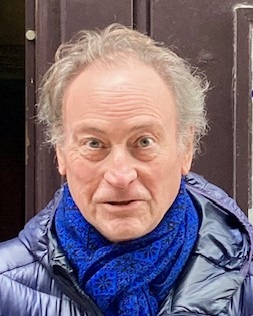First patients to receive ‘game-changing’ cancer therapy now in remission
A lifesaving medicine that destroys blood cancer has been given to the first patients in South West London and Surrey – with hugely significant results.
Seven patients at St George’s Hospital have now received the highly-effective treatment called CAR-T, and the majority are now in remission.
As well as bettering their chances of beating the disease, it’s given St George’s patients the opportunity to return to normality – including enjoying quality time with family, going travelling, or heading back to work.
One of these people is Gordon Macniven, 74, pictured, who started treatment in September after being diagnosed with lymphoma. Prior to his diagnosis, the Tooting resident loved going on day trips across London – and thanks to CAR-T, is now back to exploring the city once again.
“I enjoy walking around, and like London very much and getting out and about – whether that’s Hampstead Heath, or Covent Garden, or Greenwich,” said Gordon.
“I’m feeling much better, and have been able to go to more things, such as exhibitions – a month ago I would have really struggled with that.
“I had never heard of CAR-T, and neither had my GP. I remember coming to an appointment at the hospital, where they explained what was going to be done and the likely side effects.
“I can’t impress the kindness and expertise of the staff highly enough – they’ve been wonderful, and I don’t think they get enough praise for what they do.”
CAR-T is a one-time treatment that is offered to certain people with blood cancers including lymphoma and leukaemia. It’s usually given to those who have relapsed and haven’t responded to other treatments, such as chemotherapy or transplants.
The medicine is initially prepared at St George’s where T cells – a type of immune white blood cell – are collected from a patient and transported to a pharmaceutical company.
These are then modified and multiplied to recognise and target cancer cells. A few weeks later, the modified T cells are returned back and infused into the patient’s blood stream.
Hospitals offering CAR-T need to undergo a stringent application process and have all the required resources, facilities, and expertise.
At St George’s, a huge amount of groundwork – led by Consultant Dr Catherine Cox – was laid to coordinate specialist teams and put detailed clinical plans in place, ensuring meticulous care for every patient.
Professor Mickey Koh, Clinical Director for Renal, Haematology and Oncology at St George’s, said: “I’ve described this medicine as a game-changer because it has the power to save lives. In just a few months we’ve already seen how effective it can be – and how it gives patients hope.
“It’s a very complex treatment – but at St George’s we’re well placed to offer it because we also have experts working in intensive care, neurology and cardiology providing excellent support. I anticipate that many more patients will benefit from this incredible therapy in the months and years to come.”
Kate Slemeck, Managing Director at St George’s Hospital, said: “Our goal is to deliver exceptional cancer care to people across South West London and Surrey – and one of the ways we’ll achieve this is by providing innovative treatments like CAR-T.
“As well as changing lives right now, our specialist teams are collecting and analysing data to drive research forward – cementing our status as a teaching hospital. I’m very proud of the difference we’ve made – and will continue to make – to our patients.”


